News & Events
Newsletter #4_15 JANUARY 2024
News |
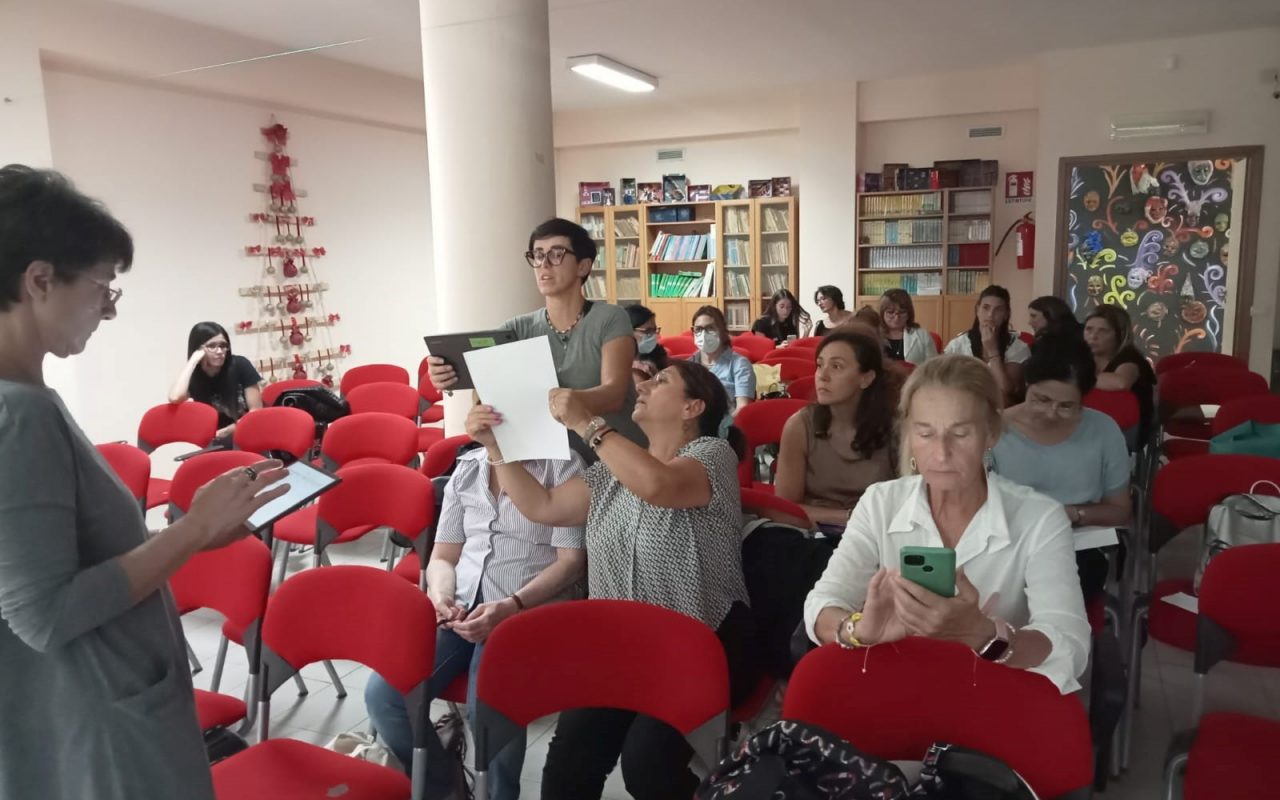
Newsletter #4
15 JANUARY 2024
Welcome To Our Newsletter #4
Welcome to our last newsletter of the Playing with Protons Goes Digital project! As you may recall, exactly one year ago we started our effort to help adapt science teaching and learning to the post-COVID19 era. Our approach to achieve this aim by fostering the digital readiness of science classrooms across Europe through the combination of exciting digital technologies with creative hands-on and minds-on activities. As we have been progressing with the project, we are enthusiastic about the appreciation and the results obtained so far. Many teachers participate in our training activities, showing a growing interest and willingness to try out our approach and methodology with their students.
We hope you enjoy reading our newsletter and invite you to check our website regularly, follow us on social media. And please feel free to get in touch with out national contacts in Greece, Italy, Spain, and the UK for bringing Playing with Protons Goes Digital to your school classroom.

Flora di Martino & Natascia Conforti
Newsletter Co-editors
Table of contents
Editorial
Multiplier event in Naples!
Hanbook is ready!
Conclusions and greetings!
The project concluded with excellent results. 150 teachers and more than 500 students from rural and non-rural schools of all levels in Greece, Spain and Italy were involved.
The results, after a careful analysis of teachers’ needs to teach science and capture the attention and arouse greater interest on the part of students in scientific subjects, were the creation of 12 scenarios and 15 AR tools, available in the Handbook (link to pdf).
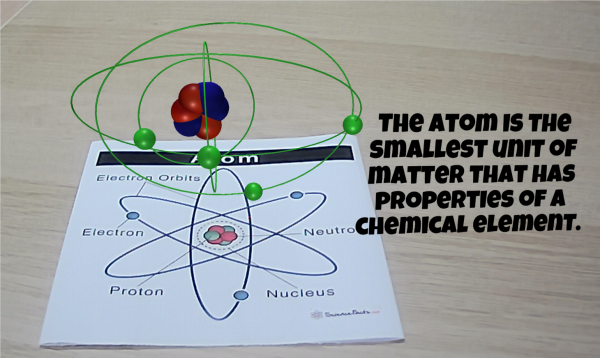
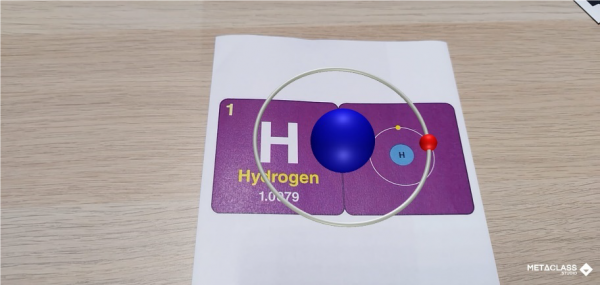
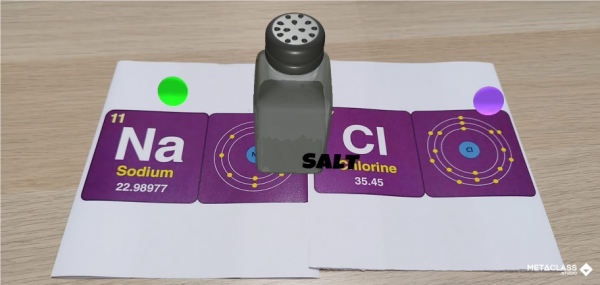
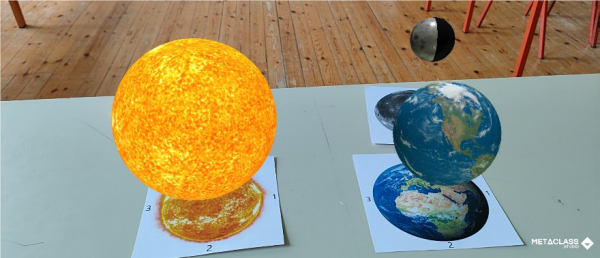
The scenarios and AR tools developed creates significant teaching and learning value for both teachers and students.
Below are some of the most significant results achieved during the project.
- Quantitative and qualitative evidence from more than 600 students aged 9-14 suggests that use of AR tools and the Scenarios increase knowledge scientific by improving their understanding of complex scientific concepts.
- Same evidence shows a significant and positive effect on student intrinsic motivation and interest in science.
- AR tools and scenarios, as perceived by teachers, has a notable equity component by offering authentic and engaging science learning activities to students in remote and rural schools that would otherwise be difficult for them to experience due to geographical and socioeconomic factors.
- Teachers involved considered using the PWPGD methodology and tools in their practice.
- Teachers found AR tools and Scenarios an effective tool also for supporting the development of transversal competencies and helpful in making their teaching more innovative, motivating, and engaging.
- Most teachers would recommend AR tools and Scenarios to their colleagues and described PWPGD activities as a cost-effective digital tool for teaching science that compares better to other available tools.
- The Scenarios solution may be an effective tool for supporting the development of transversal competencies.
- Incorporating digital tools and resources, such as AR tools, into classroom instruction can be a viable and effective approach to enhancing the quality of science education.
- Quality informal science learning experiences can significantly impact students’ science intrinsic motivation, interest in informal science learning experiences.
Good continuation of your work with the PwPGD tools!!!!
Multiplier event in Naples
In October 2023 our Italian partner from Città della Scienza in Naples held at “Giovanni XXIII-Aliotta” Institute a multiplier event providing teachers with an exciting opportunity to immerse themselves in the world of virtual reality (VR) and augmented reality (AR) and discover how these revolutionary technologies can transform the educational experience. In an innovative and interactive atmosphere, teachers acquired practical skills to integrate VR and AR into their teaching practices.
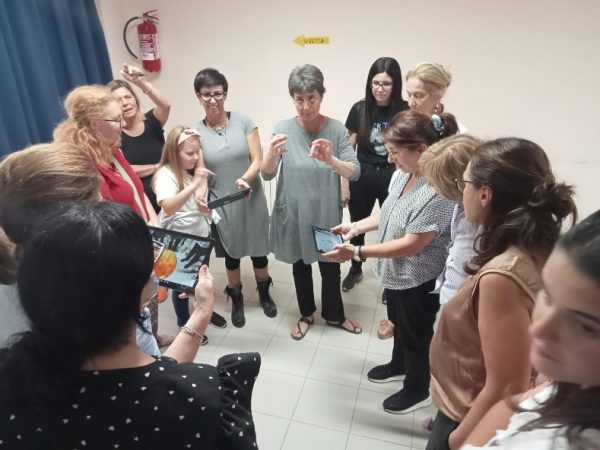
During the workshop, our expert from Città della Scienza in Naples, Flora di Martino, guided approximately 20 elementary school teachers through the basics of VR and AR, explaining how these technologies can be used to create immersive and engaging learning environments. Teachers explored specific applications for their teaching field, discovering how VR and AR can expand learning possibilities for students.
Using devices, interactive content related to the Solar System, the Atom, and the fascinating world of dinosaurs was created.
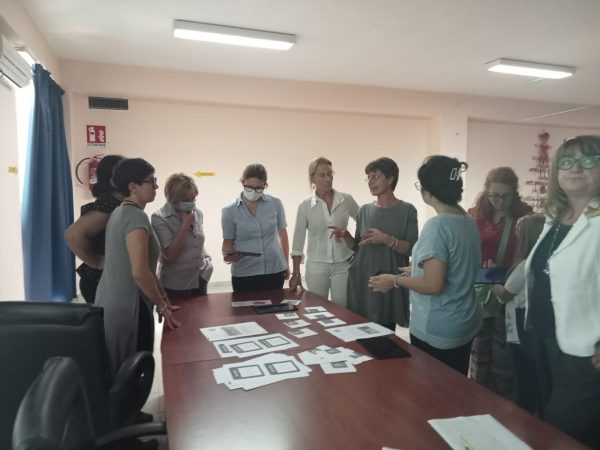
The workshop also provided an opportunity to share ideas and best practices among participating teachers, creating a learning community that promotes the effective integration of these technologies into classrooms.
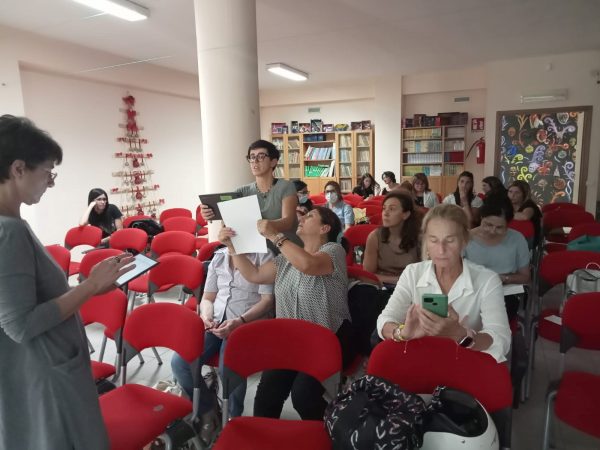
By the end of the event, teachers not only gained a deep understanding of VR and AR but also acquired the skills necessary to fully harness the educational potential of these technologies, bringing innovation and enthusiasm into their daily practice.
Playing with protons going Digital’s Handbook is available
Our handbook of an educational project on augmented reality represents a fundamental resource that synthesizes, organizes, and presents the entire educational journey clearly and accessibly. Its significance goes beyond being a simple reference document, as it significantly contributes to consolidating the learning experience, facilitating the replicability of the project, and supporting teachers in integrating new technologies into education.
Project Overview:
The handbook plays the crucial role of providing a clear synthesis of the objectives, methodologies, and results achieved during the augmented reality educational project. Essentially, it offers a comprehensive overview of the path taken, facilitating the understanding of the project’s developmental stages.
Practical Guide for Teachers:
One of the main features of the handbook is to serve as a practical guide for teachers. In addition to describing the activities and resources used during the project, it provides suggestions, advice, and best practices for effectively integrating augmented reality into education. Teachers, therefore, find in this document a valuable tool that assists them in lesson planning and adapting educational materials to the specific needs of students.
Documentation and Evaluation Tool:
The handbook also serves as an essential documentation tool. It contains detailed reports on the activities carried out, the results obtained, and the challenges faced during the project. This documentation not only attests to the effectiveness of the methodologies used but also serves as a solid foundation for project evaluation and potential future improvements.
Promoting Replicability:
A crucial aspect is the promotion of the project’s replicability. The handbook provides detailed instructions on how to implement the proposed activities, allowing other educational institutions to adopt and adapt the project to their needs. This fosters the spread of best practices and contributes to extending the positive impact of the project to a greater number of students.
Conclusion:
In conclusion, the final handbook of an augmented reality educational project plays a key role in the project’s success. Through its organized structure, it provides practical support to teachers, documents the learning experience, and promotes the replicability of the project. In this way, it contributes to making augmented reality an accessible and effective resource in the educational field.
Remarks from the Playing With Protons Goes Digital project, ended on November 30, 2023
The PWPGD project ended on November 30, 2023. It was a long trip that of than two years, started, with many difficulties and many online meetings, during the COVID period, and ended with only activities in presence and with many teachers and students who took part.
About 150 teachers and more than 500 students from about 50 Italian, Greek, and Spanish schools joined the project and have been shown a very deep interest in digital technologies and in the augmented reality.
Our AR tool, developed by the Spanish partner CREATIVITIC, has obtained excellent results as well the methodology we proposed based on the inquire based learning and alternative languages like art to teach science at school.
Augmented Reality (AR) has revolutionized the way we learn and understand science. It allows learners to experience and interact with virtual objects in a real-world environment, bringing abstract concepts to life. AR provides a highly engaging and interactive learning experience that can captivate learners’ attention and inspire curiosity. By enhancing visualization, AR enables learners to grasp complex ideas more quickly, and it can provide a safe and cost-effective alternative to traditional laboratory experiments. Our AR platform and the eleven scenarios we developed together with the teachers are available on our website:
https://playingwithprotons.infn.it/educational-scenarios
and can be used by every school now and in the next future.
The scenarios developed for the project deal with different scientific themes ranging from the history of the Universe and its constituents to the elementary particle physics and the constituents of the matter.
All the material produced, and the introductory materials, were constructed considering the different age groups of the students and the different types of schools. Particular attention has been paid to rural areas both by organising meetings at their schools and by organising online meetings and making available all the material prepared on our website.
We must certainly point out the difficulties encountered by some schools regarding the availability of digital classrooms equipped with devices such as smartphones and notebooks. It is evident that some EU schools still need time to improve the digital technologies and be ready for the new way to teach science at school.
The enthusiasm of the students (5-15 y.o.) with whom we have interacted has given us a clear signal that we must continue this path by proposing more and more hands-on and minds-on activities based on digital technologies various innovative arts-based methodologies inspired by cutting-edge science.
Finally, we would like to thank all the school directors, teachers, students and scientific experts who contributed to the success of the PWPGD project with the certainty that they have brought new ideas to schools that will help future generations to approach the world of science.
